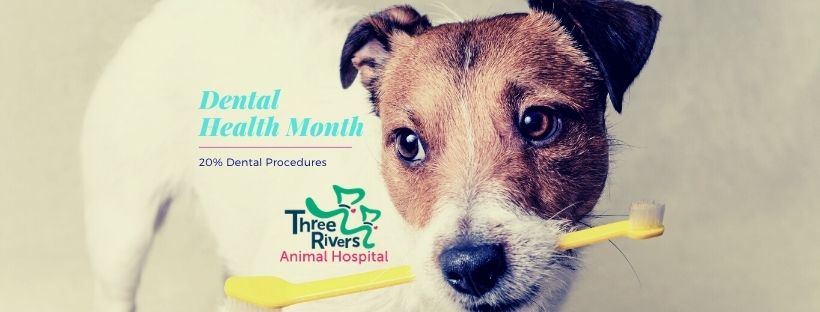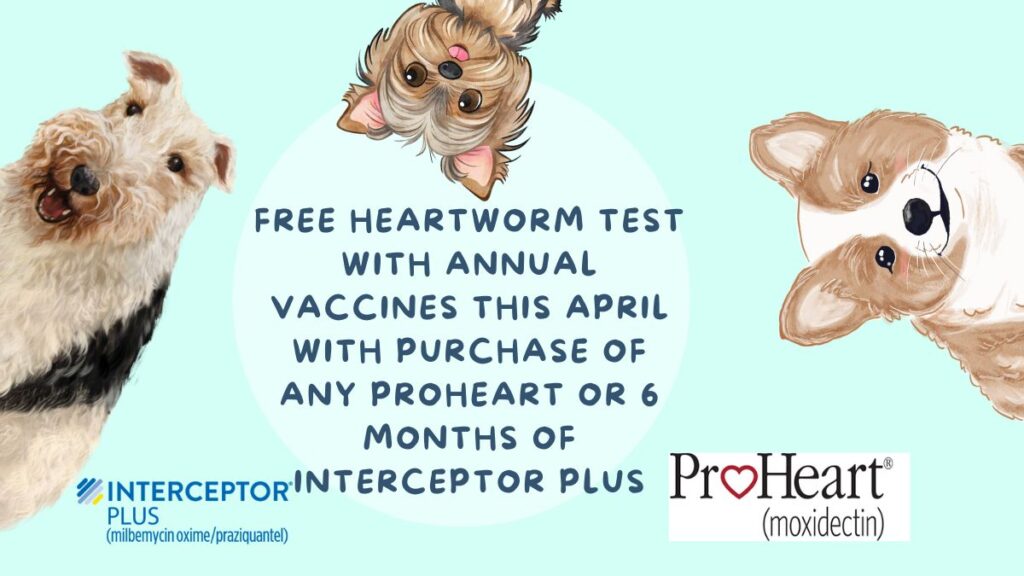
- 985-302-5362
- [email protected]
- 19412 Harrison Ave. Covington, LA 70433
Clinic Specials
Clinic Specials Offered Throughout the Year
February and August Specials-
Dental Health Month- Receive 20% off dental procedures during each month
Dental care is crucial for the overall health and well-being of your pet. Here are some benefits:
- Oral Health: Regular dental care, including brushing and professional cleanings, helps prevent periodontal disease, tooth decay, and other oral issues that can cause pain and discomfort.
- Improved Overall Health: Dental problems can lead to systemic issues affecting the heart, liver, and kidneys. Proper dental care reduces the risk of these complications and promotes better overall health.
- Fresher Breath: Good oral hygiene translates to fresher breath, making your cuddle time more enjoyable.
- Pain Prevention: Regular dental care can prevent the pain and discomfort associated with gum disease and tooth decay, ensuring your pet’s well-being and quality of life.
- Cost Savings: Preventive dental care is more cost-effective than treating advanced dental disease or complications stemming from poor oral health.
- Enhanced Quality of Life: Healthy teeth and gums allow your pet to eat comfortably and enjoy their favorite activities, contributing to a better quality of life.
Remember to schedule regular dental check-ups with your veterinarian and establish a dental care routine at home to ensure your pet’s dental health remains in top condition.

April Special-
Heartworm Awareness Month- Receive a Free Heartworm Occult with any Proheart or 6 months of Interceptor at the time of annual.
Heartworm prevention is essential for maintaining the health and well-being of pets, particularly dogs and cats. Here are the primary reasons to prioritize heartworm prevention:
- Serious Health Risks: Heartworm disease can lead to severe, potentially fatal health problems, including damage to the heart, lungs, and blood vessels. Preventing heartworms avoids these severe complications.
- Cost-Effectiveness: Preventative medication is far less expensive than treating a heartworm infection. Treatment for heartworm disease can be costly, involving extensive veterinary care, hospitalization, and medication.
- Simplicity and Convenience: Heartworm prevention is straightforward and typically involves monthly oral or topical medications, or semi-annual injections. These preventative measures are easy to administer compared to the complex treatment regimen required for an infected pet.
- Irreversible Damage Prevention: Even after successful treatment, heartworm disease can cause permanent damage to the heart and lungs. Preventing the disease means protecting pets from lasting harm.
- Infection Risk: Heartworms are transmitted by mosquitoes, which are prevalent in many areas. Pets are at risk whenever mosquitoes are present, making prevention crucial, especially in regions with high mosquito populations.
- Avoiding Painful Treatment: The treatment for heartworm disease is not only expensive but also painful and stressful for pets. It involves a series of injections with arsenic-based compounds and strict activity restrictions for several months.
- Protecting Overall Health: Heartworm disease can weaken a pet’s overall health, making them more susceptible to other illnesses and infections. Preventing heartworm supports overall health and vitality.

May Special-
Feline Health Month- Save 15% on Feline Annuals Vaccines with Wellness Bloodwork
Wellness bloodwork is a crucial aspect of feline health care. Regular blood tests can provide valuable insights into a cat’s overall health, allowing for early detection and management of various conditions. Here are the key reasons for the importance of wellness bloodwork in cats:
- Baseline Health Information: Establishing baseline blood values when a cat is healthy helps veterinarians identify changes or abnormalities in future tests. This baseline is essential for comparison over the cat’s lifetime.
- Early Detection of Disease: Routine bloodwork can detect diseases in their early stages before clinical signs become apparent. Early detection allows for timely intervention, improving the prognosis and management of conditions such as kidney disease, diabetes, hyperthyroidism, and more.
- Monitoring Chronic Conditions: For cats with known chronic illnesses, regular bloodwork is crucial for monitoring the progression of the disease and the effectiveness of treatments. It helps in adjusting medications and treatment plans to maintain the best possible health.
- Pre-Anesthetic Screening: Before any surgical procedure, bloodwork is essential to ensure the cat is healthy enough to undergo anesthesia. It helps identify any underlying issues that could complicate anesthesia or surgery, allowing for safer outcomes.
- Senior Cat Health: As cats age, they are more susceptible to various health issues. Regular bloodwork in senior cats can help detect age-related diseases early and manage them more effectively, improving the quality of life and longevity.
- Identifying Hidden Infections: Bloodwork can uncover infections that might not be evident through physical examination alone. Early detection of infections allows for prompt treatment, preventing further complications.
- Organ Function Evaluation: Blood tests evaluate the function of vital organs such as the liver, kidneys, and pancreas. Identifying organ dysfunction early helps in managing conditions and preventing severe complications.
- General Health Monitoring: Routine bloodwork provides a comprehensive overview of a cat’s health, including red and white blood cell counts, which can indicate anemia, inflammation, or immune system issues.

June and July Special-
Bump Your Lumps- Receive 20% Mass Removal Procedures with Histopathology
Removing a pet’s mass and submitting it for histopathological examination (histopath) is a crucial step in veterinary care for several reasons:
- Diagnosis: Histopathology provides a definitive diagnosis of the mass. It helps distinguish between benign (non-cancerous) and malignant (cancerous) tumors, as well as identify the specific type of tumor or other pathological conditions.
- Treatment Planning: Knowing the exact nature of the mass aids in formulating an effective treatment plan. For malignant tumors, the type and grade can guide decisions about surgery, chemotherapy, radiation, or other treatments.
- Prognosis: Histopathological results offer insight into the likely course and outcome of the disease. This information helps veterinarians predict the pet’s future health and survival chances, enabling better preparation for potential outcomes.
- Complete Removal Verification: For masses that are surgically removed, histopathology can confirm if the excision margins are clear of tumor cells, indicating that the mass was completely removed. This is crucial for reducing the risk of recurrence.
- Understanding Metastasis Risk: Histopathological examination can reveal characteristics of the mass that indicate the likelihood of metastasis (spread to other parts of the body). This knowledge is vital for monitoring and managing the pet’s overall health.
- Identifying Infections or Inflammation: Some masses may result from infections or inflammatory conditions rather than tumors. Histopathology can identify these causes, leading to appropriate treatment with antibiotics or anti-inflammatory medications.
- Guiding Follow-Up Care: The results can determine the need for further diagnostic tests or monitoring. For example, pets with malignant tumors may require regular follow-ups to check for recurrence or spread.

September Special-
Silver Whiskers September- Save 20% off Senior Wellness Packages
Senior Wellness Packages include Doctor’s Exam, Radiographs and Wellness Bloodwork
As pets age, their health care needs change, and a comprehensive approach to their medical care becomes increasingly important. Regular exams, radiographs (X-rays), and bloodwork are critical components of senior pet care, offering numerous benefits that help maintain and improve their quality of life. Here are the key benefits of each:
Physical Examination
- Early Detection of Health Issues: Regular physical exams allow veterinarians to detect signs of aging-related conditions, such as arthritis, dental disease, heart problems, and more. Early detection can lead to more effective treatments and better outcomes.
- Monitoring Weight and Condition: Senior pets are prone to weight changes, which can indicate underlying health issues. Regular exams help monitor weight and body condition, ensuring proper nutrition and diet adjustments.
- Assessing Mobility and Pain: Veterinarians can evaluate a senior pet’s mobility and check for signs of pain or discomfort. This is crucial for managing conditions like arthritis and ensuring the pet’s comfort.
Radiographs (X-rays)
- Assessing Bone and Joint Health: X-rays are essential for diagnosing and monitoring conditions like arthritis, hip dysplasia, and other degenerative joint diseases common in senior pets.
- Evaluating Heart and Lung Health: Radiographs can reveal changes in the heart and lungs, such as heart enlargement, fluid buildup, or tumors. Early detection allows for timely treatment of cardiac and respiratory conditions.
- Identifying Tumors and Masses: X-rays can detect tumors or masses in various parts of the body, including the abdomen and chest. Identifying these growths early can significantly impact treatment options and outcomes.
- Monitoring Internal Organs: Radiographs provide a view of internal organs, helping detect issues like kidney or bladder stones, liver enlargement, and other abnormalities.
Bloodwork
- Evaluating Organ Function: Blood tests assess the function of vital organs, including the liver, kidneys, and pancreas. Early detection of organ dysfunction allows for prompt and targeted treatment.
- Detecting Metabolic and Endocrine Disorders: Bloodwork can diagnose conditions like diabetes, hypothyroidism, and hyperthyroidism, which are more common in senior pets. Early intervention helps manage these conditions effectively.
- Monitoring Blood Cell Health: Complete blood counts (CBC) help identify anemia, infections, and immune system disorders. This information is crucial for diagnosing and treating various conditions.

October Special-
Canine Wellness Month- Save 15% off Canine Annual Vaccines with Wellness Bloodwork
Wellness bloodwork, performed in conjunction with annual vaccines for dogs, is a vital aspect of preventive veterinary care. Here are the key reasons for incorporating bloodwork into the annual health check-up and vaccination schedule for canines:
Comprehensive Health Assessment
- Establishing Baseline Values: Regular bloodwork helps establish baseline health values for each dog. These baselines are crucial for comparing future test results, allowing for the early detection of any deviations from normal.
- Early Disease Detection: Bloodwork can reveal signs of underlying health issues that are not yet showing clinical symptoms. Early detection of conditions such as kidney disease, liver disease, diabetes, and thyroid disorders allows for timely intervention and better management.
Monitoring Organ Function
- Kidney Function: Blood tests can detect early signs of kidney disease, which is common in dogs as they age. Monitoring kidney function helps in adjusting diet and medications to manage the condition effectively.
- Liver Function: Bloodwork assesses liver enzymes and other markers to detect liver disease early. Early intervention can prevent severe liver damage and improve the prognosis.
Evaluating Overall Health
- Anemia and Blood Disorders: Complete blood counts (CBC) can identify anemia, infections, and other blood-related disorders. These conditions might not show visible symptoms until they are advanced.
- Immune System Health: Bloodwork provides information about the dog’s immune system status, helping to ensure they are in optimal health to receive vaccines safely.

November Special-
No Hump November – Receive 20% off spay procedures
Spaying your pets offers numerous benefits:
- Population Control: Spaying helps reduce the number of unwanted animals, easing the burden on animal shelters and reducing euthanasia rates.
- Health Benefits: It reduces the risk of uterine infections and breast tumors in female pets
- Behavior Improvement: Spaying can reduce aggressive behavior and it eliminates the heat cycle in females, reducing anxiety and restlessness.
- No Heat Cycles: Female pets won’t go into heat, which means no messy discharges, yowling, or attracting unneutered males to your doorstep.
- Longer Lifespan: Spaying can lead to a longer, healthier life for your pet due to the reduced risk of certain diseases and injuries associated with mating behaviors.
- No Unwanted Litters: Preventing unplanned pregnancies saves you the stress and financial strain of caring for multiple offspring.
- Environmental Impact: Reducing the number of pets reduces the strain on natural resources, like food and water.
It’s important to discuss the timing of spaying with your veterinarian to ensure the best results for your pet’s health and behavior.

December Special-
Deck the Halls with a Few Less Balls- Receive 20% off neuter procedures
Neutering your pet, whether it’s a cat or a dog, offers several benefits:
- Population Control: Neutering helps control the pet population, reducing the number of unwanted animals and the strain on animal shelters.
- Health Benefits: It can reduce the risk of certain reproductive cancers and infections, such as testicular cancer and prostate issues in males.
- Behavior Improvement: Neutering can decrease aggressive behaviors, such as territorial marking and roaming, making your pet less likely to get into fights or accidents.
- Reduced Roaming: Neutered pets are less likely to roam in search of a mate, minimizing the risk of getting lost, injured, or into altercations with other animals.
- Decreased Spraying: Neutering can help reduce or eliminate urine marking in cats, which is especially important for maintaining a clean and odor-free household.
- Longer Lifespan: Neutering can contribute to a longer, healthier life for your pet by decreasing the risk of certain diseases and injuries associated with mating behaviors.
Consult with your veterinarian to determine the appropriate timing for neutering your pet, taking into consideration their breed, age, and overall health.

